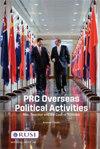III. Risks of Reaction: Australia’s Experience with Aggregation
Q4 Social Sciences
引用次数: 1
Abstract
Chapter II illustrated the varied risks that overseas political activities of the CCP and its supporters have presented to liberal democracies, particularly those with multicultural societies. These can be understood as the risks of inaction. But the risks of responding to these challenges also demand careful consideration. Australia offers an example of public policy responses based on the aggregation approach that addresses this array of issues primarily as a matter of national security. This may have helped to mobilise rapid legislative action and rally other liberal democracies to action. However, as this chapter argues, Australia’s experience also illustrates major drawbacks to the aggregation-based approach. Canberra’s efforts to counter PRC political activities have been hailed – and promoted – internationally as a pioneering model to follow. In February 2018, then US Assistant Secretary of Defense Randy Schriver said Australia had ‘done us a great service by publicising much of this activity and then taking action’. National Endowment for Democracy Vice President Christopher Walker testified to a US Congressional hearing that European states should ‘learn from countries, such as Australia, that3反应的风险:澳大利亚的聚合经验
第二章阐述了中国共产党及其支持者的海外政治活动给自由民主国家,特别是那些拥有多元文化社会的国家带来的各种风险。这些可以理解为无所作为的风险。但应对这些挑战的风险也需要仔细考虑。澳大利亚提供了一个基于聚合方法的公共政策应对措施的例子,该方法主要将这一系列问题作为国家安全问题来解决。这可能有助于动员迅速的立法行动,并团结其他自由民主国家采取行动。然而,正如本章所述,澳大利亚的经验也说明了基于聚合的方法的主要缺点。堪培拉打击中国政治活动的努力在国际上被誉为一种开拓性的模式。2018年2月,时任美国助理国防部长Randy Schriver表示,澳大利亚“通过宣传这一活动的大部分内容并采取行动,为我们做出了巨大贡献”。国家民主基金会副主席克里斯托弗·沃克在美国国会听证会上作证称,欧洲国家应该“向澳大利亚等国家学习
本文章由计算机程序翻译,如有差异,请以英文原文为准。
求助全文
约1分钟内获得全文
求助全文
来源期刊

Whitehall Papers
Social Sciences-Archeology
自引率
0.00%
发文量
12
期刊介绍:
The Whitehall Paper series provides in-depth studies of specific developments, issues or themes in the field of national and international defence and security. Published three times a year, Whitehall Papers reflect the highest standards of original research and analysis, and are invaluable background material for policy-makers and specialists alike.
 求助内容:
求助内容: 应助结果提醒方式:
应助结果提醒方式:


